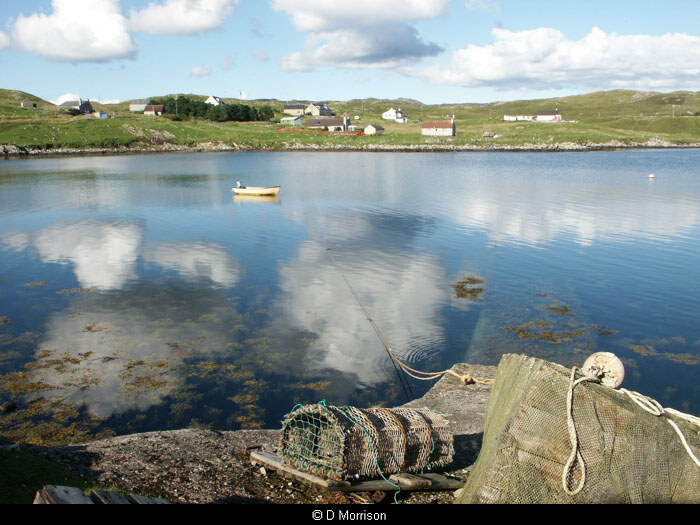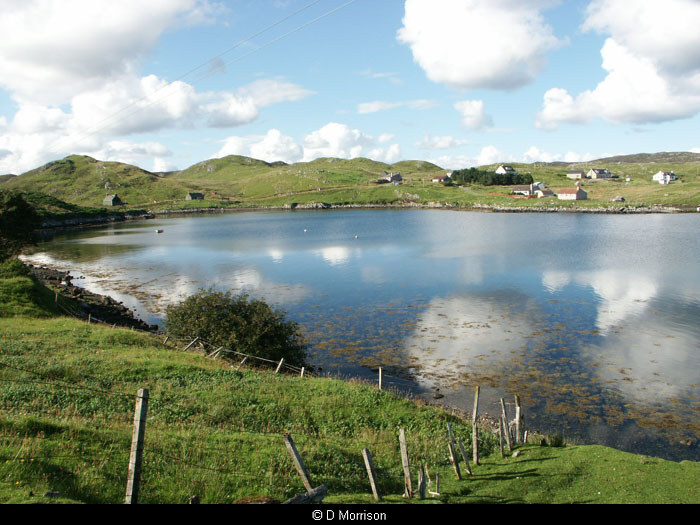42650: The Orinsay Trials I: the Case
An account of the Orinsay Trials of 1891, following the attempts by landless cottars to resettle the farm (see also the full account of the raids); from Tional, 1996.
The mad cow phenomena is not new. Indeed bovine sanity was a matter of great concern in Orinsay over a hundred years ago. So much so that it became the leading argument advanced by chief prosecution witness Roderick Martin, tenant of Orinsay Farm in the trial of twenty seven cottars from Lochs who were charged with trespass following their attempt to resettle Orinsay in March 1891.
Mr Martin claimed that the men did not willingly harm any of his sheep or cattle. However, by their presence they had frightened the sheep away from the best pasture and the site of the huts the men had erected had terrified his cows and drove one of them mad. Sheriff Jameson, responding to the outbreak of laughter in court commented that she must have been a sensitive animal before making the point that if the sheep and cattle were moved off it showed that the men were occupying the ground to the exclusion of the animals.
The village of Orinsay had been cleared in 1838 and over the years a number of attempts were made to allow resettlement there. Overpopulation on allocated crofts had led to increasing want and poverty among the cottars and their families and they were forced to take direct action to occupy their former lands, which had been turned into a sheep farm after the evictions.
The trial of twelve of the men took place in Stornoway Sheriff Court on April 15th 1891. The men were, Malcolm MacKenzie, Crossbost; Donald MacMillan, Crossbost; Donald MacDonald, Crossbost; John MacKenzie, Ranish; Murdo Morrison, Leurbost; John MacKenzie, Crossbost; Donald MacLennan, Marvig; Kenneth MacKay and Donald MacKenzie, Calbost and Allan MacAskill, Robert MacMillan and Kenneth MacPhail, Gravir. They were charged with an offence under the Trespass (Scotland) Act, 1865 that on March 24th 1891 and subsequent days they occupied or encamped on private land without the consent of the superiors, Lady Matheson the proprietrix or her tenant Mr Roderick Martin.
Kenneth MacDonald, Solicitor, Inverness had been asked to represent the men, but recognising that their case was weak, he had telegraphed "Cannot leave important engagements here for mere empty display there". Donald MacRae, late headmaster of Balallan School and inspirational leader of the Park Deer Raid several years earlier agreed to defend the accused.
Before the trial began, Donald MacRae lodged a number of objections. His first submission questioned the relevancy of Mr John Ross appearing for the Crown on the grounds that he was the private legal agent for both Lady Matheson and Roderick Martin and it was on Lady Matheson’s complaint that the prosecution was instituted. Secondly, he stated that taking the whole circumstances of the case into consideration it was perfectly manifest that there had been collusion between the estate officials and the criminal authorities, based on the fact that the interdict proceedings and the prosecution for trespass were sprung upon the accused simultaneously. The third objection was that an Act of Parliament had been passed at the beginning of the century which rendered anyone to a fine not exceeding one hundred pounds if they prevented or tried to interfere with fishermen for squatting on lands on uncultivable ground within a hundred yards of the high water mark.
Sheriff Jameson dismissed the first two objections on the grounds that the prosecution for trespass was brought at the instance of the Procurator Fiscal. Mr John Ross had a commission as a Depute Fiscal and he was entitled to act on the instruction of the Procurator Fiscal in cases of this kind. The interdict had been solely instigated by Lady Matheson and Mr Ross was not acting in any capacity in these proceedings. A decision on the third objection was deferred because Mr MacRae could not produce a copy of the act and its relevancy to the trespass charge would arise on the merits of the evidence presented before the court. If the evidence stated that they were squatting on the land for the purpose of fishing that point would be considered.
Mr Macrae then disputed the right of Lady Matheson to be a party to the action and her entitlement to sue. The Sheriff said she was not a party to the case which had been brought by the Procurator Fiscal. "Do you question her title to the island" the Sheriff asked.
"I deny her right to be called proprietrix of the island" said Donald MacRae.
"I will not accept that as a preliminary objection as the prosecution will only need to prove that the men squatted on the land without the leave of the proprietrix or her tenant", said the Sheriff.
The accused then tendered a plea of not guilty.
Details
- Record Type:
- Story, Report or Tradition
- Date:
- 1891
- Record Maintained by:
- CEP

